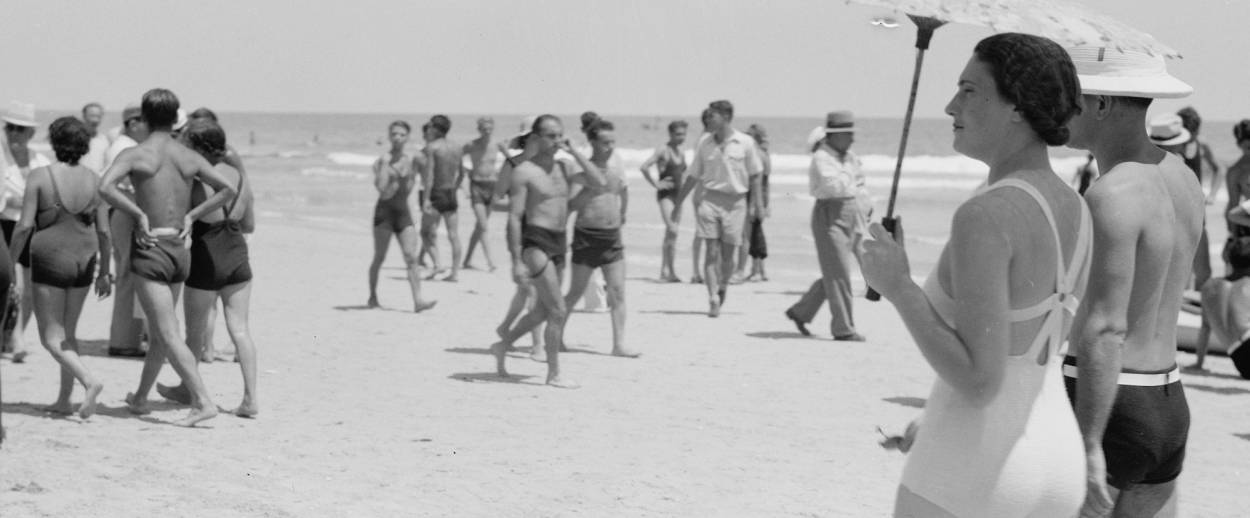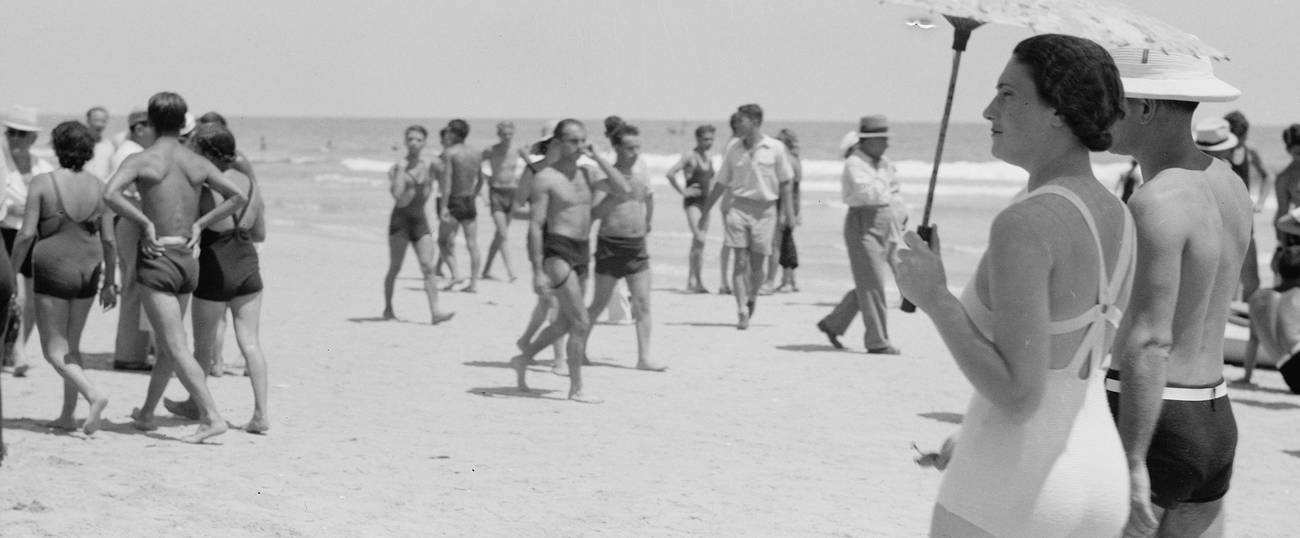An Ode to Tel Aviv, Long Lost Lover
All this time, I thought I was the sophisticated one who left behind a dusty, provincial town. I had it all backwards.




I was 23 when we broke up. I was young, but that was hardly an excuse. She was my first love, older and sweaty and rich with mysteries. I could look at her for hours, and when I tired of looking I would close my eyes and take in her scent, that sweet heady mixture of jasmine and ficus and days spent trying to outsmart the sun. When I moved in with her, my fingers were still stained with the grease I used each morning to shine my army boots, but she didn’t seem to mind. I wasn’t her first, but she made me feel like I was the only one who ever mattered, and she made me want to be a better man even when I had no idea how to become one or even what a better man might be. For a while there, I thought she liked her guys tough, so I took stabs at smoking and prayed that the dead-eyed stare I put on with each drag came off as pensive and cool rather than a symptom of how sick each cigarette made me feel. Then it was on to an avant-garde phase, with tickets to see modern dancers and throat singers and drunken bards in clubs that smelled like urine. When the latest affectation faded away, both of us laughed it off; we were still both plenty young, and we were allowed to play dress-up all we wanted before we surrendered to maturity and its fixities.
Ours ended like love stories always do, with a hundred chafing arguments, with one or two moments too many spent seriously thinking what life would be like without her, with an awkward evening of silence pierced by sudden goodbyes. I still loved her, but I didn’t think she could give me the kind of life I wanted. The kind of life I wanted was in New York.
I have always lusted after Manhattan, and Tel Aviv, my beloved, always had an intuition. She knew that to me, to borrow a line from the poet, New York was a town that existed in black and white and pulsated to the great tunes of George Gershwin. In Tel Aviv, I could be warm and creative and beloved and sandy and well-fed and tanned, but only in New York could I be as monumental as the buildings and as sharp, containing multitudes. What use to me were Allenby Street and Dizengoff Square, parched old relics cracked by the heat, when Bemelmans Bar beckoned and Florent, that crazy diner inside an old meat locker, whispered to me to come and join the merry misfits who congregated there each night around 3:00? I wanted to wake up in the city that never sleeps; and then, one day, I did.
For many years, I hardly thought of Tel Aviv. When I saw her, on brief visits every other year, I frequently recalled a line by the late Israeli playwright Hanoch Levin, who wrote that farewells were never the same for the one leaving and the one staying behind. I had left, I told myself, and now I was a man in full, the sort of chap who knew how to make a strong martini and write a decent book. She had stayed behind, and she was still lovely, but her hopes were still aimed too high and her standards still set too low. I felt sorry for her. When we met, I was comically courteous, the way one can be only with small children or former lovers.
This week, I visited her again. It was supposed to be another quick check in, a brief peck on the cheek, and I was happy to distract myself from thoughts of the Iranian deal with Arak on the beach and masabacha in the shuk. I approached Tel Aviv with the sort of soft distant benevolence I’ve mastered over the years. But things just weren’t the same. This time, there was something else about her.
I heard it in the cadences of the lifeguards on the beach, shouting out their poetry to a mob of swimmers who chattered in Russian and Arabic and English and French and Hebrew: “Lady, you with the bikini that looks like starfish, get out of the deep,” or “If you lost an 11-year-old boy, we have him here, but don’t hurry back. We’ll raise him right.”
I saw it in the gorgeous new park erected over Sharona, site of the pre-state German colony, where high-end pizza joints and gorgeous playgrounds now stand where Nazi flags once flew and where, later, the Israeli army stored much of its musty bureaucracy.
I felt it in the way people spoke to me in English even as I made an effort to address them in Hebrew, realizing that my native tongue is now bleached by a trace of an American accent.
It dawned on me slowly, but when it did, it couldn’t be any clearer: I had it backwards all along. Tel Aviv was the one that had moved on. And it looked at me, together with its new young lovers, with just as much pity and regret as I had felt for it all these years. With my baseball cap and my madras shorts, I was the provincial tourist, the dolt who stood quietly in line at the bakery and commended himself for not jostling around because he believed good manners were the ultimate virtue, the sad sack who traded the deeply intoxicating drumbeats of the tribe for the finicky jazz notes of some foreign and cold capital.
I had believed, once upon a time, that the course of my personal evolution depended on moving away from the Mediterranean, moving westward to the temples of reason and the halls of prosperity. I had believed that history tumbled forward in clear phases, and that progress meant having the courage to leap from one to the other, and that enlightenment dictated extending a hand to those who had, for whatever reason, fallen behind. I had believed that the future shone bright for those who vigorously championed peaceful resolution of conflicts, who worked to usher their brethren into the global economy, and who looked to the international community for guidance. These were all things I thought Tel Aviv was too thickheaded to understand. It never occurred to me that this city and the ancient land it had carried into modernity were looking at me as they had looked on so many conceited young men hailing from so many empires, now long gone. It never occurred to me that they had considered my aspirations before. It never occurred to me that they knew something about human nature on the shores of the Mediterranean that they haven’t ever considered on the Hudson. It never occurred to me that in Tel Aviv, I was a lovable idiot.
This is the other arrogance, seldom studied in American universities, not of West toward East but of East toward West, of eternal nations shielded by undying faith looking down at nice, neatly dressed men and women and mocking their weakness and their earnestness and their illusion that we all want the same thing and that it’s the duty of the learned to teach the less fortunate about the true nature of their desires. This is what I felt on the beaches and the streets of Tel Aviv this week. It made me love her all over again, of course, maybe even more than ever before. But it’s too little now, and much too late.
***
Like this article? Sign up for our Daily Digest to get Tablet Magazine’s new content in your inbox each morning.
Liel Leibovitz is editor-at-large for Tablet Magazine and a host of its weekly culture podcast Unorthodox and daily Talmud podcast Take One. He is the editor of Zionism: The Tablet Guide.